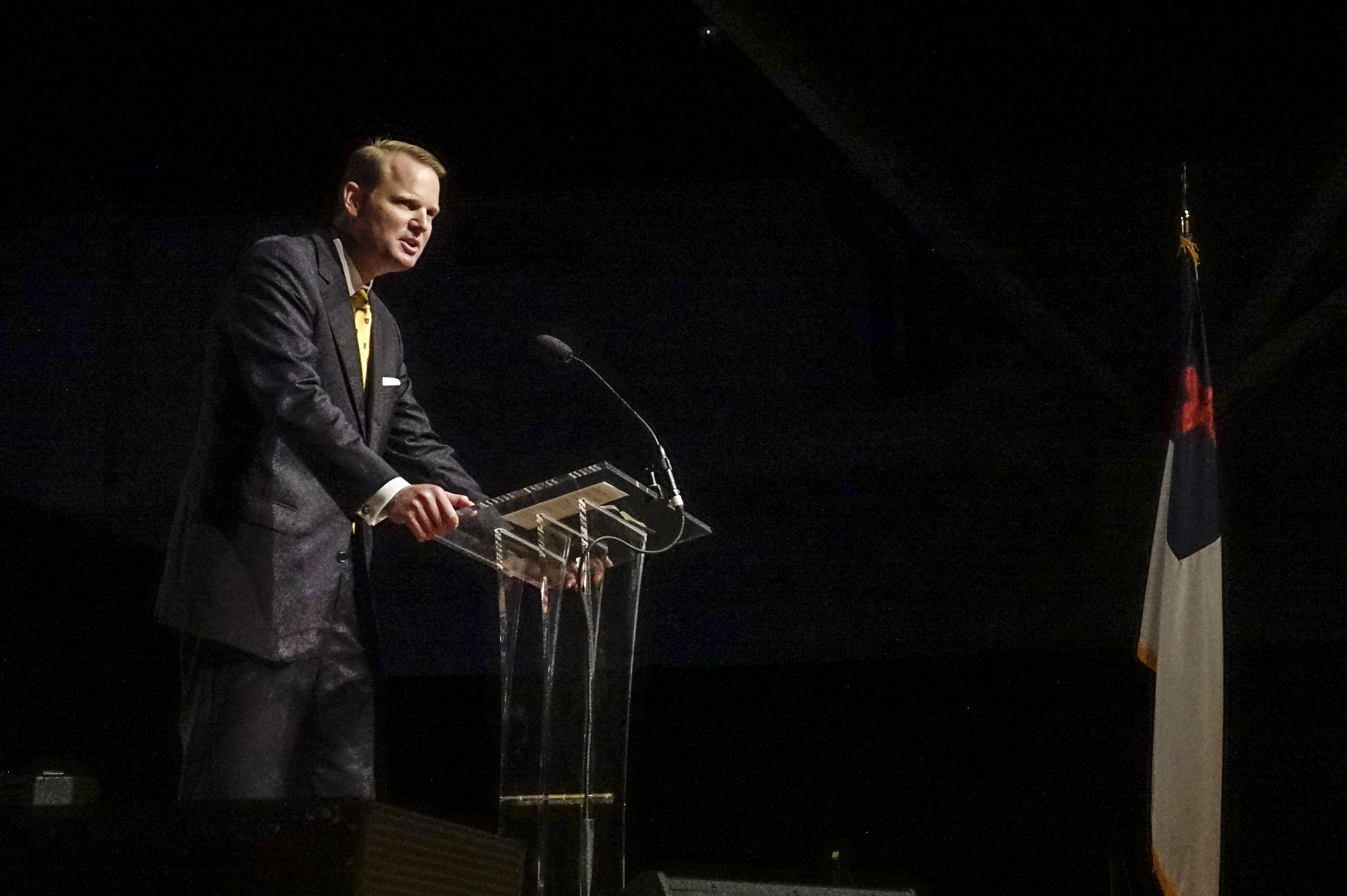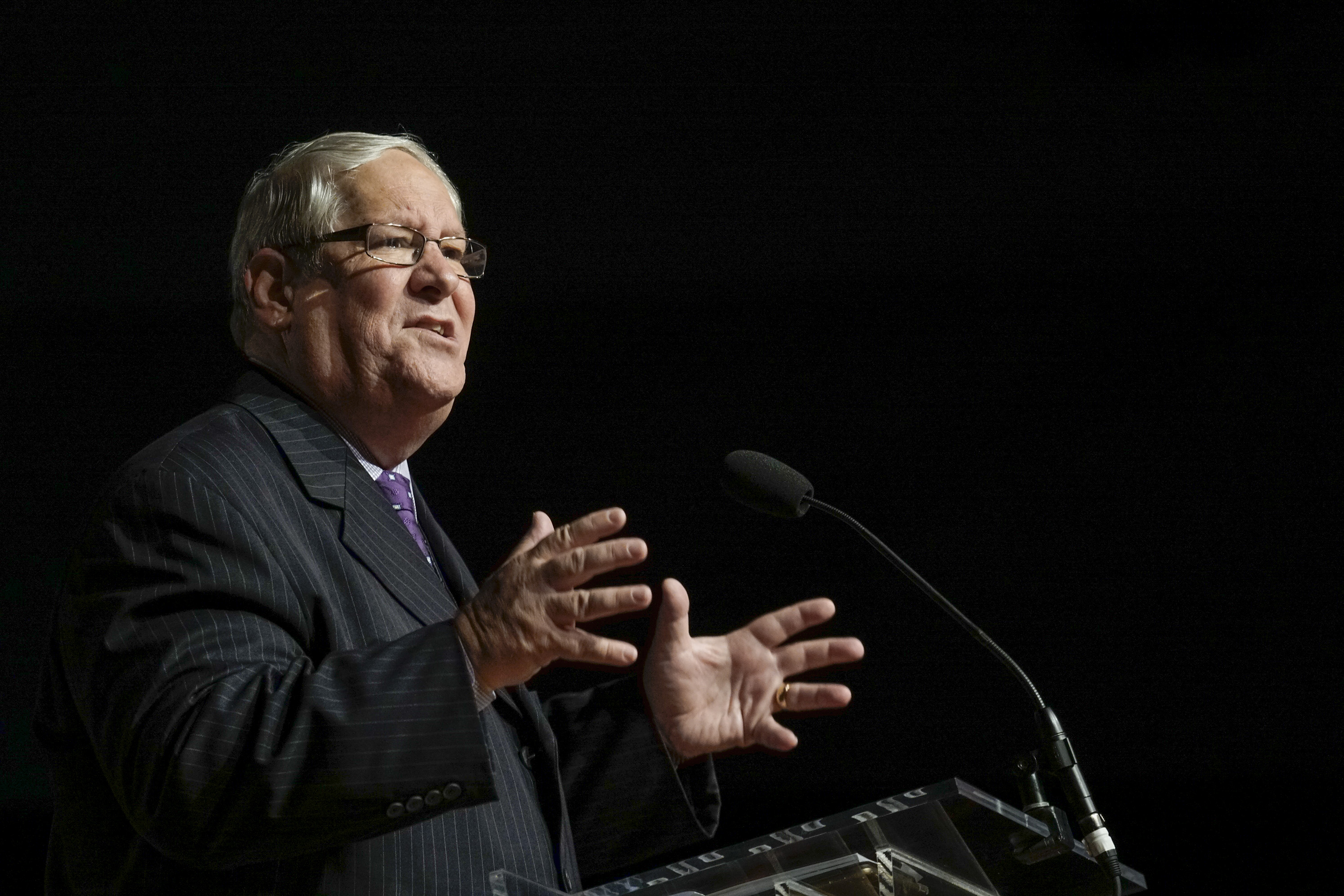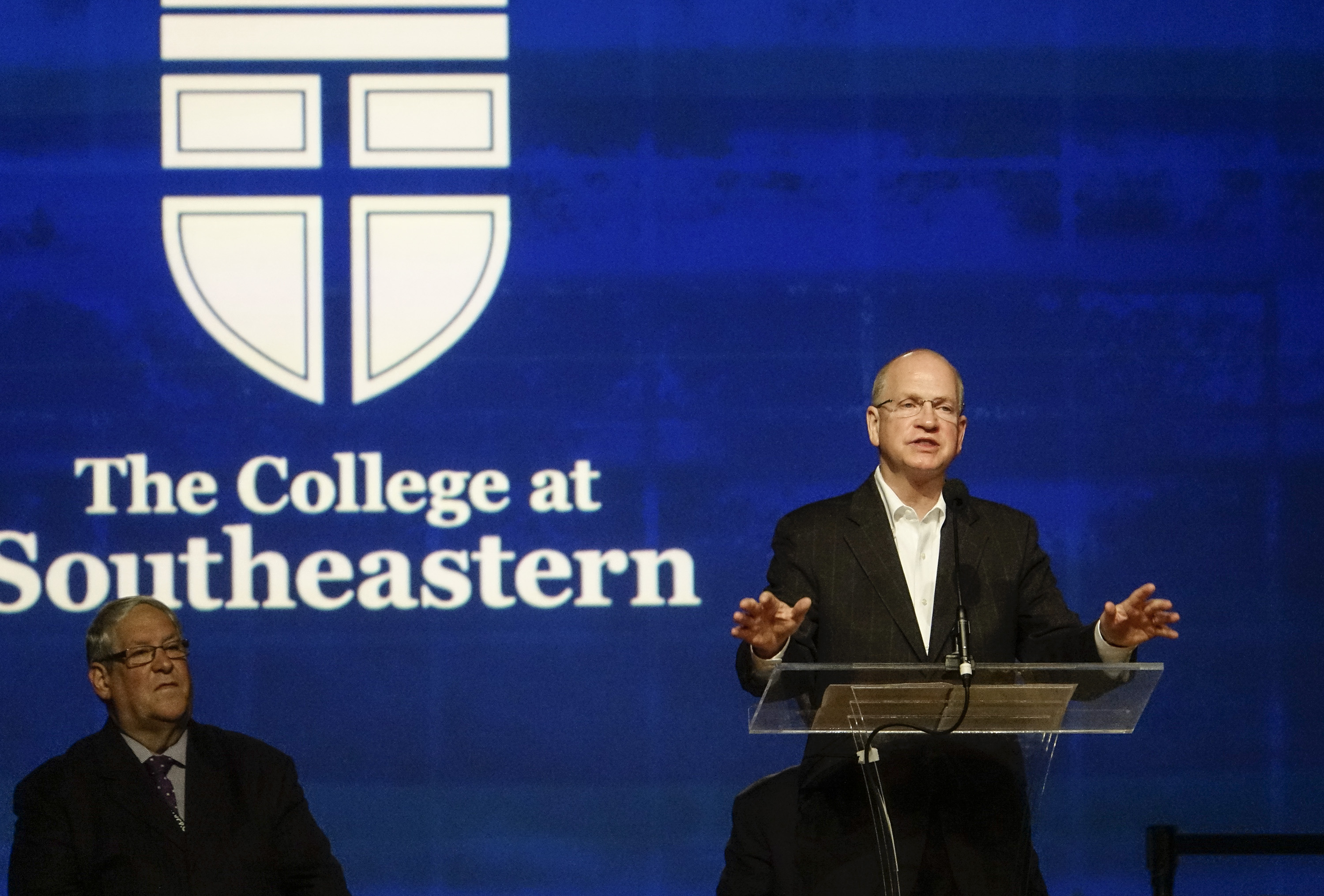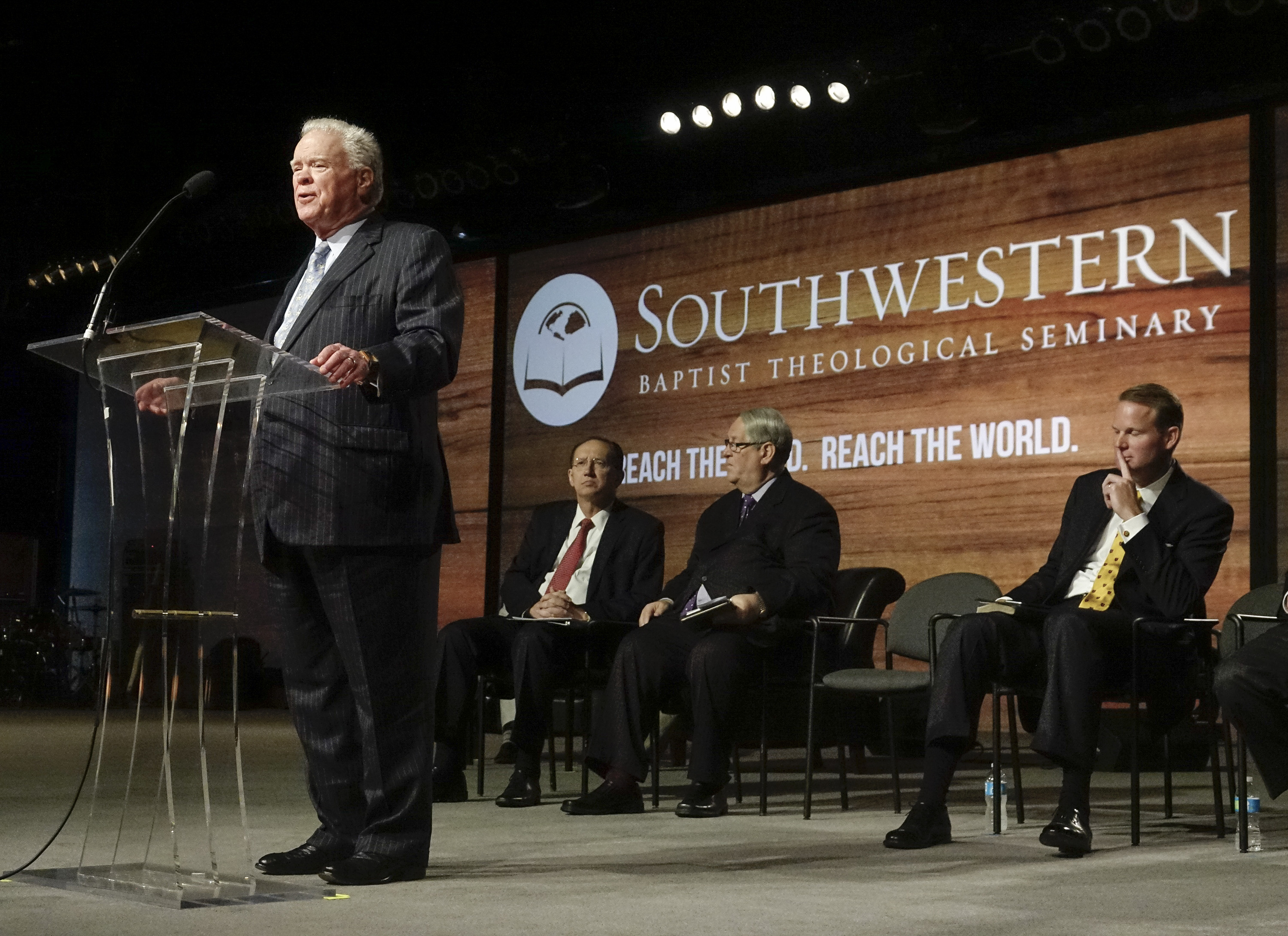
ST. LOUIS (BP) –- Presidents of the Southern Baptist Convention’s six seminaries noted growth in ministry, enrollment and financial support in their reports to messengers June 15 at the SBC annual meeting in St. Louis.
Gateway
 “We are welcoming Dr. Jeff Iorg who got a new job yesterday as president of the Gateway Seminary in the state of California,” SBC President Ronnie Floyd said June 15 as he introduced Iorg for the seminary’s report to the Southern Baptist Convention.
“We are welcoming Dr. Jeff Iorg who got a new job yesterday as president of the Gateway Seminary in the state of California,” SBC President Ronnie Floyd said June 15 as he introduced Iorg for the seminary’s report to the Southern Baptist Convention.
The seminary’s name change from Golden Gate Baptist Theological Seminary was affirmed by SBC messengers the previous day, after a first vote in 2015. SBC bylaws require two consecutive years of messengers’ approval for such a change.
Iorg called the seminary’s transition over the past two years “one of the most significant relocations in American history.”
“Today the first moving trucks transporting our equipment from northern California are being unloaded in Ontario [in Southern California]. Starting next Monday, we will begin moving into our new primary campus near Los Angeles. We will open that campus on July 5 and be ready to go as Gateway Seminary.
“By the end of this year, we will have two new campuses in Ontario and Fremont to anchor our work on the West Coast,” Iorg continued. “We will have relocated dozens of families, employed about 50 new people, created two new student bodies, transitioned all technological functions, opened new student housing, created new student housing options, established a new organizational plan and implemented a new compensation plan.
“To say the least, it has been quite a ride over these two years.”
Iorg told messengers that God has enabled the seminary to do these things without rancor or division.
“The Gateway Seminary family has displayed remarkable discipline, institutional humility, personal sacrifice and divine patience,” he said. “Former employees are ending service graciously, new employees are taking on tasks with enthusiasm and relocating employees are experiencing God’s blessings as they find houses, churches, schools and jobs for their spouses.”
Iorg said enrollment at the former Bay Area campus in Mill Valley declined as its closure became imminent, but the regional campuses and the online enrollment increased so that the seminary’s overall enrollment remained steady.
“This progress, while largely positive, has not come without cost,” Iorg said. “The spiritual, emotional and financial toil of our employees and students has been significant. The remarkable response so many have made does not discount the difficulty they have been through. Our employees and students have been remarkable models of the truth that the mission matters most. While they have made this determined choice, it has not been easy.
“Our employees and our students who have made this great transition possible are the heroes of this process, and I salute them this morning for their hard work.”
Iorg reported that Gateway Seminary has multiplied the $85 million received for the sale of the Mill Valley property to more than $100 million in assets for future use, including about $70 million in real estate, without any deferred maintenance — and designed for ministry in the 21st century — all debt-free.
“When we conclude the construction process, we will own two debt-free campuses in prime locations in California worth over $52 million,” Iorg said. “We will also own a development lot in Ontario worth $4 million. We will own a building in Brea, Calif., worth about $4 million. We will own two student apartment complexes worth over $8 million and the new Casey and Doris DeShon Missionary House in Ontario worth $500,000.”
Iorg said the decision was made to build a campus equipped with essentials to accomplish the seminary’s mission, including classrooms, faculty offices, administrative offices, library, chapel and community gathering space — and not other facilities like gyms, childcare centers and bookstores.
“When millions of people have not yet heard the name of Jesus Christ and our mission force is being slashed, Gateway Seminary has chosen to model frugality and simplicity to prioritize future resources for global missions.”
Iorg said Gateway Seminary is built on the foundation of Golden Gate Baptist Theological Seminary, healthier than any time in its history.
“We are battle-tested and ready to go forward,” he said. “We thank you for your support, your gifts over the years and for your prayers. Keep sending us your students, and thank you for all you’ve done to make this relocation possible.”
Midwestern
 Midwestern Baptist Theological Seminary President Jason Allen reported to messengers that its mission of existing for the church is the reason for a dramatic enrollment increase and other signs of God’s favor over the past four years.
Midwestern Baptist Theological Seminary President Jason Allen reported to messengers that its mission of existing for the church is the reason for a dramatic enrollment increase and other signs of God’s favor over the past four years.
Noting an enrollment surge of almost double since 2012, a report by school accreditors of MBTS being among the fastest growing seminaries in North America and stories of key financial contributions to the school, Allen said all are signs of God’s evident blessing upon the Kansas City-based school.
“I have told people in recent weeks that I believe Midwestern Seminary is the most remarkable story of theological education in North America,” Allen said. “That’s a big, bold statement, but … what God has done at Midwestern Seminary is nothing short of spectacular.
“To what do we attribute all of this? I believe from the top of my head to the bottom of my feet that God is choosing to bless Midwestern Seminary because of three words — ‘for the church.'”
Allen said God has called the seminary’s leadership, faculty and staff specifically to devote their best energies and full resources toward serving the church.
Allen took the messengers back four years to think about the seminary’s condition, when enrollment hovered at approximately 1,200 students. There are now just over 2,300 students. He added that expectations for next year are to officially exceed twice the size of what it was in 2012.
“In fact, so remarkable is our growth that our accrediting agency, ATS [Association of Theological Schools], notified me about a year ago … that Midwestern Seminary is one of the fastest growing seminaries in North America,” he said.
“By the criteria that matters most,” he added, “they labeled us the fastest growing seminary in North America.”
Allen continued, saying that financial gifts to the school continue to be a source of blessing and encouragement.
He noted that he stood before messengers last year and announced that over the previous two years, MBTS had received more gifts and near-term pledges financially than the total accumulation of gifts and near-term pledges since the school’s founding in 1957.
“I stand before you today to give an even more remarkable word,” Allen said. “This past year, our gifts and near-term pledges have actually surpassed the total I announced last year.”
One specific example Allen noted was the generosity of the Mathena family from Oklahoma City who gifted the seminary $7 million as a lead gift toward a campus student center.
Of the project, Allen said, “Given the growth of our residential community, we have chosen to fulfill the ambition of this seminary since 1957 to have an established student center on this campus that meets the needs of our students, of our spouses and families, and of the collective seminary community.”
Relating back to God’s favor toward Midwestern Seminary, Allen admitted his favorite part: “The sweetest development for me the past few years has been to see this vision, ‘for the church,’ go from being my vision … to being the vision for Midwestern Seminary.
“Who do I thank for a school roughly twice the size, for financial blessings coming day to day? I thank God for kind providence and, under God, I thank you, Southern Baptists, who are placing your confidence in us.”
New Orleans
 New Orleans Baptist Theological Seminary President Chuck Kelley addressed the messengers of the Southern Baptist Convention for the 20th time in his current role as an entity leader. He took the opportunity to express thanks for the SBC’s Cooperative Program for the $149 million given to NOBTS during his 20-year tenure as president.
New Orleans Baptist Theological Seminary President Chuck Kelley addressed the messengers of the Southern Baptist Convention for the 20th time in his current role as an entity leader. He took the opportunity to express thanks for the SBC’s Cooperative Program for the $149 million given to NOBTS during his 20-year tenure as president.
“We are so grateful for our partnership,” Kelley said. “We are grateful for what God is doing in the School of Providence and Prayer.”
When the seminary was created in 1917, only a few Southern Baptist churches existed in New Orleans, Kelley said. The city was anything but a Baptist stronghold.
“We were put there to be a lighthouse as well as a schoolhouse,” Kelley said. “From that day when we started with five or six Southern Baptist congregations, there are more than a hundred Southern Baptist congregations in New Orleans now, nearly all of them started by students and faculty of New Orleans Baptist Theological Seminary. New church plants are still going on today.”
The task of New Orleans Seminary is to prepare students to answer the call of God, Kelley said. The curriculum blends classic theological training — biblical studies, theology, church history and preaching — with the practical — interpersonal relationship courses and evangelism training.
“[Every student] must spend at least one semester going out door-to-door in the city of New Orleans sharing Jesus Christ and learning how to bring people to Christ,” Kelley said. “We simply have to get the Gospel out from behind our pulpits into the streets and neighborhoods of our cities and communities.”
Kelley lauded an anonymous donation given to establish the Fred Luter Jr. Scholarship for African-American students, which will provide $150,000 per year for African American students studying in New Orleans and Atlanta.
“We know we have to raise up a generation of leaders who can lead not only in African American churches, but who can bring that African American voice into the affairs of the Southern Baptist Convention.,” Kelley said. “That is a very high priority for us.”
Another anonymous gift in 2014 established the Caskey scholarships for bivocational ministers and those who serve smaller membership churches. The full-tuition scholarships are available for students serving in Alabama, Louisiana and Mississippi. The program places a high value on biblical exposition and evangelism. Students receiving the scholarship are required to engage in at least one Gospel conversation each week. The results have been phenomenal.
“In the past two years, these students have had 7,585 Gospel conversations with people who are lost,” Kelley said. “Four thousand, seven hundred and eighty-seven of them got to the point to ask someone to give their lives to Jesus Christ and 1,061 people were born again.”
New Orleans Seminary was voted into existence by the Southern Baptist Convention in 1917 and held its first classes in 1918 and will celebrate its 100th anniversary in 2017 and 2018. As a part of this centennial celebration, the seminary will prioritize evangelism, Kelley said.
“Our goal is for the New Orleans Seminary family to have 100,000 Gospel conversations to celebrate our 100th anniversary,” Kelley said. “We think lifting up Jesus is the best way to celebrate what God is doing at NOBTS.”
Southeastern
 Southeastern Baptist Theological Seminary President Danny Akin, in his report to messengers June 15, spoke on the seminary’s mission and vision to work with churches in making disciples of all nations.
Southeastern Baptist Theological Seminary President Danny Akin, in his report to messengers June 15, spoke on the seminary’s mission and vision to work with churches in making disciples of all nations.
“We are a Great Commission seminary,” Akin said. “We love to partner with churches in doing theological education under the umbrella of the Great Commission.”
A new way SEBTS is partnering with local churches is to make theological education accessible to lay leaders. Starting this fall, Southeastern will offer new GO Certificates for Christians at any level. “We’ve been praying and thinking for several years, how is it that we might also serve our local churches even better, in a more direct kind of way,” Akin said.
The certificates are completely online and provide a flexible schedule for students to work at their own pace. The classes can help Bible study leaders, Sunday School teachers and others to go deeper in their understanding of Scripture so that they can better serve in their ministries.
“We also believe that we are called to partner with the churches in doing theological education. In fact, we believe that the best theological education takes place in partnership with local churches,” Akin said.
Because of this, Southeastern has redesigned its master of divinity degrees to strengthen the core curriculum and reduce the total hours to 81. In addition, the seminary created several new master of arts degrees and now has six fully online degrees that can be completed from anywhere.
Akin also reported that the seminary, located in Wake Forest, N.C., is in its sixth year of record enrollment with more than 3,500 students. The Kingdom Diversity Initiative, an effort to make the SEBTS student body more reflective of the church in heaven, made significant strides, going from 8.3 percent in 2011 to 15.5 percent in 2016, growth of more than 137 percent in the non-white student population.
One way that Southeastern is making an impact on the nations is through its Global Theological Initiative program, which seeks to enhance theological education in at least 15 different locations around the world through strategic partnerships.
Akin told of his recent opportunity to attend the graduation of 23 master of theology students from Brazil. He brought back a message of thanks to Southern Baptists from Pastor Fernando Brandão, president of the Junta de Missões Nacionais, or the Brazilian Baptist National Mission Board.
Akin repeated Brandão’s message with these words: “My great, great, great-grandfather was brought to faith in Jesus by a Southern Baptist missionary. My entire family can trace its religious origins back to the witness of a Southern Baptist missionary, and I am doing what I do today because Southern Baptists came and gave. And our family met Jesus through their efforts.”
In closing, Akin mentioned the new official SEBTS hymn, “For the Cause,” written by Keith and Kristyn Getty and Stuart Townend. After reading a few lines from the hymn, Akin said, “When students come to Southeastern, from the very first convocation service until graduation, they will be reminded on both ends. We are committed to being obedient to the final marching orders of King Jesus until he comes again.”
Southern
 Southern Baptist Theological Seminary’s record-setting enrollment numbers testify to an ideological paradox of the cultural revolution, SBTS President R. Albert Mohler Jr. said during his June 15 report to messengers in St. Louis.
Southern Baptist Theological Seminary’s record-setting enrollment numbers testify to an ideological paradox of the cultural revolution, SBTS President R. Albert Mohler Jr. said during his June 15 report to messengers in St. Louis.
Despite the supposed death of conservative theological education foretold by mainline liberalism 50 years ago, the confessional seminaries of the SBC are healthier than ever, Mohler said. Although experts in theological education said only seminaries that adopt a secularized message would survive, that has not been the case, he noted, pointing to the fact that Southern Seminary’s enrollment exceeded 5,000 students for the first time in its history during the 2015-2016 academic year.
“Here’s the great paradox: The seminaries that followed that methodology and adopted that trajectory are the seminaries that are dead or are dying,” Mohler said. “It is the seminaries that have refused to bend the knee … that are not only surviving but by God’s grace, thriving.”
Mohler said more is now required of Southern Seminary, located in Louisville, Ky., and the other SBC seminaries than any other time in the history of the convention. Although the Gospel message itself never changes, the challenges before the graduates of Southern Seminary are dramatically different than when the seminary was founded in 1859.
“We are on the hinge of history right now, of such massive change,” Mohler said. “The secularization that is going on in the society around us, the massive intellectual worldview challenges we now face, the moral revolution that now so characterizes our times is producing a context of ministry that is not only markedly different than that experienced by previous generations, it is one that is increasingly marked by hostility toward the cause of Christ and His Gospel.”
Concluding his report, Mohler thanked messengers for their support and for funding the seminary through the Cooperative Program, which helps prepare ministers to face the rising cultural challenges concerning gender identity and sexual orientation.
“There are more young men training for the Gospel ministry and to pastor churches on the campus of Southern Baptist Theological Seminary right now than have ever been at any place in the history of the Christian church. And for that we are so very, very thankful,” Mohler said.
Southwestern
 Paige Patterson, president of Southwestern Baptist Theological Seminary, noted to messengers how the theology of all six SBC seminaries leads to evangelism and missions.
Paige Patterson, president of Southwestern Baptist Theological Seminary, noted to messengers how the theology of all six SBC seminaries leads to evangelism and missions.
“Today, we have a gracious theological bequest from our heavenly Father. We have done everything we can to return these six seminaries to a testimony for Christ,” Patterson said in this report to the annual meeting in St. Louis. “When the theology is right, it will produce a waterfall of evangelistic and missionary involvement.”
Patterson told of the evangelistic zeal of Southwestern’s 75 students and faculty who participated in the door-to-door evangelism efforts of Crossover St. Louis. After five days, 105 people had made a profession of faith.
Patterson specifically noted an interaction between M.Div. student Kim Whitten and a troubled woman she met in a hospital. After a student participating in Crossover became overheated and required medical attention, Whitten used her time in the hospital waiting room to intentionally seek out people with whom to share the Gospel. After praying, a woman sitting across from her caught her attention. She told Whitten, “Today is the worst day of my life.” After the woman shared many of the tragedies that had taken place in her life recently, Whitten led her to faith in Jesus Christ.
“Now that is what ought to happen coming out of a theological institution,” Patterson said.
Additionally, Patterson noted another recent evangelism initiative by the seminary that resulted in the salvation of 192 men and boys. Patterson, who has spoken at multiple wild game and sports banquets across the United States, said the seminary held a similar event on Southwestern’s campus in Fort Worth, Texas, hosting 2,000 men and boys.
Patterson addressed the ongoing work of Global Theological Innovation (GTI) – an initiative developed at Southwestern to cultivate and develop networks of partnerships to influence theological education worldwide. Since its beginning, GTI has formed 96 international partnerships. GTI partners with each seminary to review curriculum, send Southwestern professors and SBC pastors to teach courses, and train its faculty members.
“Everywhere in the world, theological education is facing major difficulties. The involvement of our seminaries, which you have made possible, is making a difference,” Patterson said. “In many cases we are restarting a seminary that has gone out of existence, and in some places, establishing a new one. But everywhere, [GTI] is providing theological preparation for the church ministry. We are very grateful to God for what you have made possible.”
Patterson concluded, thanking the messengers for their continuous prayer and support through the Cooperative Program. “We as your six seminary presidents never take for granted that we are serving on your behalf and for your best interest, and, above all else, for Christ’s sake and for the Kingdom of God,” Patterson said. “Thank you for your Cooperative Program support and for all that you do.”
















